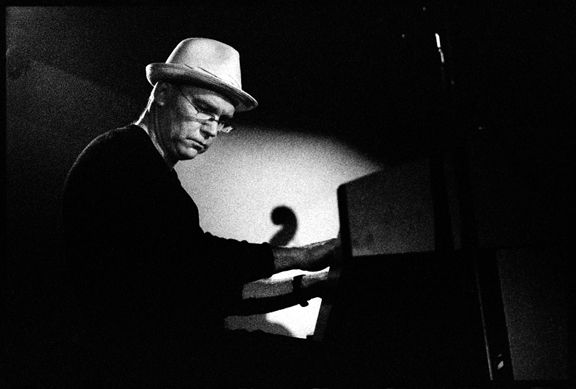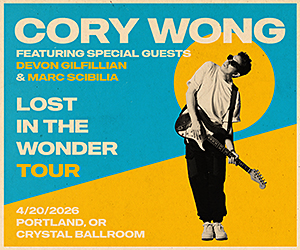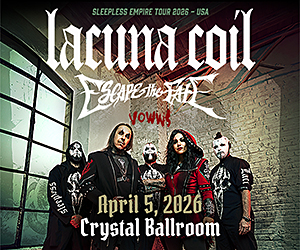Home > Jazz / Blues
04/27/2018
Wayne Horvitz and Rebecca Sanborn on Sweeter Than the Day and The Blue Cranes Q&A
By LISA HELFER // Wayne Horvitz and Blue Cranes' Rebecca Sanborn talk about Saturday, April 28's show featring with Sweeter Than the Day and the Blue Cranes at the Jack London Revue
On Saturday, April 28, 2018, Wayne Horvitz and Sweeter Than the Day (Wayne Horvitz – Piano and Keyboards, Timothy Young – Guitars, Keith Lowe – Acoustic Bass, and Eric Eagle – Drums) will grace the stage of the Jack London Revue for the very first time at 9pm. The Portland’s legendary multi-genre, Jazzish quintet, the Blue Cranes (Reed Wallsmith – alto saxophone, Joe Cunningham – tenor saxophone, Rebecca Sanborn – keyboards, Jon Shaw – bass, and Ji Tanzer – drums) go on second at 10:15pm.
I talked with Wayne and Rebecca about the upcoming show separately. Both agreed the event will be like a reunion for everyone.
Wayne: “We always love the Blue Cranes and are psyched to play with them,” said Horvitz. They have been such great hosts over the years. We are also super excited for Rebecca and Ji who just had a baby! I’ve never played at the Jack London, but I’m really looking forward to it.”
Rebecca: “Sweeter Than the Day really sank into us on one specific tour,” said Sanborn. “I remember listening to “Forever” a lot…staring out the window of the bus, hearing “Love, Love, Love” which we later recorded ourselves. It brings back really beautiful memories. We’ve played with Wayne before and recorded with Tim. He (Tim) will playing a couple of numbers with us actually at the Jack London Revue. Wayne and all of the guys are really wonderful!”
Q&A with Wayne Horvitz
L: A few years back in an interview with Christian McBride, you said you were not a jazz composer, but an American composer. Why not jazz?
W: Well, I’ve never felt qualified to say I’m a Jazz composer, I guess. I’m not saying at all that jazz doesn’t heavily influence my music, but it’s one influence. I don’t play Giant Steps up tempo for example and haven’t memorized every great Jazz solo. My leanings are broader and less specific—sometimes I think I’m spread too thin, I wish I could take the time to do that, but I keep being pulled in so many directions.
L: You moved to Seattle in 1988. A year prior, you were in New York when Michael Dorf opened the first Knitting Factory and according to him, you were heavily involved with its inception. Dorf tells a story on the Knitting Factory’s web site about calling you from a Village Voice ad because he was looking for acts for new night called “Jazz on Thursdays.” He goes on to say you basically told him he didn’t know what he was doing and you then offered to host the jazz night.
During this period, you introduced him to Fred Frith, Butch Morris, John Zorn and many of the other downtown avant-jazz luminaries. He also says that your night created the club’s “very first line outside at the club.” Can you talk about this time period?
W: That story is very funny and true. Dorf gave me a $150 to host the evening. The first night, I booked Fred Frith and Butch Morris, then a Zorn show a bit later. Eight weeks later, you could hardly get a gig at the Knitting Factory we were so booked!
Working with Butch was much more important for me, really than working with Zorn. Butch took me under his wing, he represented a bridge for me from the black avant-garde jazz scene of Cecil Taylor, Ornette Coleman, and William Parker to what became the downtown New York jazz scene. The very first record I ever made was actually with William Parker and Butch Morris, called Some Order, Long Understood (Black Saint Records – 1982). Morris was brilliant, he coined the term Conduction, which I love—it’s a type of structured free improv.
L: Why piano and keyboard and how? When did this start for you?
W: As I recall, I played a little piano at six or seven. The John Medeski’s of the world started at three and you can tell! I’m always a bit jealous of this. I played guitar a little and my mom asked if I wanted to take lessons and I said no. A few years later said asked if I wanted to give piano another go. Pretty soon after I started getting a taste for electronic keyboards and it all started making sense—I was listening to a lot of that music and pretty intrigued.
L: You’ll be with Sweeter than the Day on Saturday night, how is different to play with this group vs. Zony Mash?
W: Zony Mash is loud and funky, more on the Rock side. Sweeter Than the Day is softer, a lot of the material is like ballads without words. So, Zony Mash started because I always loved the Meters and I’m not really an organ player, I’m a piano player who plays an organ. I met this young man incredibly talented young man, named Timothy Young and though it would be great to start a band together. Also, as you probably know, in Zony Mash I play organ vs. piano.
I really never expected the reception we received from Zony Mash. My wife was pregnant at the time and I was trying not to travel, but I wanted to get out of the house a few nights a week and play a regular Tuesday gig. So, we started at the OK Hotel. I thought it would be just for the fun of it. I was mostly focused on a lot of avant-garde projects and working with groups I knew in New York—and that was 23 years ago!
We don’t have horns in Sweeter Than the Day, as we do in Zony Mash. It was pretty organic, we were playing Zony Mash songs and then tried some different material acoustic and were like “oh my gosh, these songs work really well like this, why didn’t we think of this before?” We play different material for each band.
L: You have always had so many configurations going on. How do you balance them all musically and keep the sound for each so unique?
W: That’s a really good point, my process is definitely collaborative. If I’m going to make music, it’s with a certain type of friend and musician. If I’m going to do that long term with people, there has to be a lot of energy going on.
L: How do your projects evolve?
W: The quickest answer to your question regarding process is this…if I think I’m talented in any way, it’s as a composer…that comes easy. I feel that I’ve been very fortunate to be around people who really like my music. I meet 14 and 15-year-old kids who play circles around me—being a traditional player doesn’t come easy to me. From the beginning, it’s been like this. I was working with Frisell and Ehrlich and they had been playing since high school, I started later.
When you make anything artistic, as a sculptor, for example, you work with materials to make something. For me as a musician, it’s really about putting people together. That’s what I like. Someone asked me “what’s a composer?” and I said, “a composer is someone that tells people what to do.” I’ve never been shy about that! *laughs*
L: Let’s talk solos, do you think about them and rehearse them? How much is improvisation?
W: I’m always thinking everyone else’s solos are better than mine. Mine are improvised, I never know what’s going to happen when it does. This is one of the nicest things about both Sweeter Than the Day and Zony Mash. We don’t come to shows with a list of songs to play. I just start a tune and that lends to another level of improvisation, because we don’t know what we will play or what the evening will be like…it’s liberating.
L: Any new projects coming up?
W: My new projects are old projects, but new in the sense that I wrote them because of time now they are they are finally coming to fruition.
I just finished the editing and mixing of Those Who Remain, parts 1 and 2, it should come out very soon. It was inspired by two poems by the iconic Northwest poet Richard Hugo. The piece premiered on October 29th, 2015 at Benaroya Hall as part of the Sonic Evolution Series. It’s titled, “Concerto for Orchestra and Improviser” and is a two-movement composition for orchestra with the Seattle Symphony and Bill Frisell.
I’m also going to release a single CD of my project called, These Hills of Glory. I composed this for the Odeon Quartet—it’s a concerto, but the concertos are improvised. The piece is scored for string quartet and improviser.
Last thing is a very interesting trio record I did with Geoff Harper and Eric Eagle. Tim’s not on this one. We were offered some free studio time in Whitefish, Montana at Snow Ghost studio, so we are calling the project Snow Ghost Trio. There are lot of electronics but quiet, the electronics are processed through the piano. It's a quiet record and meditative. The sound is very subdued and I’m very happy about it. I’ve never done anything like this before. We will be doing a bunch of gigs in 2018/2019 to support the record.
Q&A with Rebecca Sanborn
L: You were 8 months pregnant when you spoke with Tom D’Antoni last. Congratulations on the birth of your new baby! Your first shows back were in March? How do you feel about it now?
R: Thank you, her name is Nadia and she will be four months old next week. We did start playing again in March with our show Swansea and we took her to the show at two months. Our nanny stayed with her in the greenroom. I got to hang out with her while we sound-checked. We then played a 40-minute show. When I walked into the green room afterwards, she was wanting her mama pretty badly. I nursed her and thought, wow, this is so different! Last time this year, I was having a beer! It is all kind of surreal.
It feels really good, though I had envisioned or hoped to reintegrate her into our lives as musicians and it has happened. My husband Ji and I are in several bands together and music is our life. I’m excited, because this is what we are going to be doing the rest of our lives and now she’s a part of it. It’s less problematic than I thought it would be. Nadia hears music all the time and also in utero. For whatever reason, I played so many shows when I was pregnant—now, she is used to it and rolls with it. She is super chill and falls asleep.
This show at the Jack London will be different, because its late. I can bathe her and nurse her and then get to the venue! We did an extra-long rehearsal today and she fell asleep and did great! She gets the hiccups a lot and Ji takes her over to the drums and does a quiet solo and her hiccups are gone!! We are discovering that music has its uses for childrearing!!
L: What will you be playing at the show?
R: We will be playing a longer set than normal and playing “Beware the Pneumatic Nailer” which we haven’t played in almost 10 years. It was dusty and rusty. We’ll also be doing a new song by Joe Cunningham and digging up some oldies, but goodies. Tim will be joining us for a couple of numbers and we are really looking forward to playing with him. Anyone who comes to see the show should really listen carefully to Tim—he is such an amazing, jaw-dropping musician and so he does it with so much heart.
L: The Blue Cranes music is often thought of as multi-genre. What was the intent behind this configuration originally?
R: Reed Wallsmith is the founder, leader and primary songwriter. He and Ji went to high school together. The band origination story is pretty unusual. Reed got a gig at a center for adults with mental challenges. Reed asked Ji to do a duo for this good cause to entertain the patients, this is what prompted the beginning of the band! Reed wanted to play with Ji and also realize his songwriting.
I went to all of their shows and was studying with Randy Porter at the time. I had an unconventional singer-songwriter background, but I love different sounds. I naturally gravitated to what they were doing. They tried out many different guitarists and it just never worked out, so Reed asked me to play keys. I was scared, but Reed guided me, and the keys started to fit in naturally. I’ve never been a diarrhea of the keys player wanky solos, I’ve always wanted to serve the song. That is actually the vision of the Blue Cranes, to serve the song. Joe Cunningham came on board later—he’s an amazing writer and truly incredible. It’s hard for me to remember how we played before Joe! Now we also have John Shaw. What we do is similar to ensemble playing. We serve the composition and are a bit different. People pick solos to play, but we are not trying to blow over the changes. It’s always about the song.
L: What is your musical background?
R: I started writing songs when I was about six. I remember from a very early age, I played what I was supposed to learn, but I would discover a chord, focus on it and play around it. My mom realized that I was improvising and starting to write music. I started out with folk, but my stuff was much more colorful than what is typically thought of in that genre, because I always listened to Jazz—it was my dad’s favorite. In college, I double majored theater and music, but it was a contemporary program. I studied theory and practice, but a lot in college that was unconventional musically. We had a new music series, for example, and I had Jazz teachers, but I didn’t do a lot with ensembles. I studied with Randy later on and this further expanded me. – Ji went to PSU for Jazz studies and my education was very different. Maybe that’s what Reed liked, because I was doing something non-typical and that’s my natural proclivity as a musician. If I have a moment to myself, I sit down with a glass of wine, I see the scene and follow the story. I always write it with lyrics.
L: Do you have any new projects coming up?
R: Yes! We put out a Swansee project last year when I was pregnant. The record release was in December. I was freaking out and getting ready for the baby. It was funny to do that release party 9 months pregnant for sure!
We also have a new album of collaborations with vocalists, in the mixing stage. We recorded it at The Map Room, Type Foundry, and in Reed’s basement. It is being mixed by composer/bassist Todd Sickafoose and doesn’t have a name quite yet.








